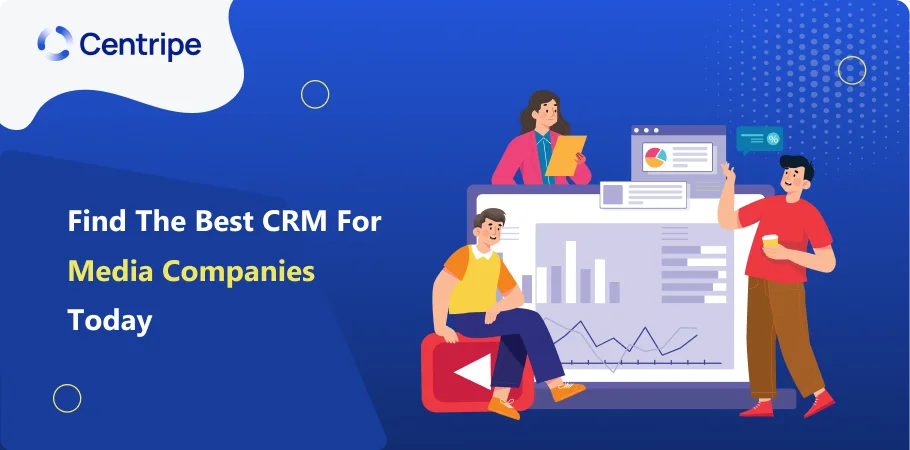If there’s one word that best describes the media and entertainment industry, it’s unpredictable. Over the past few decades, this industry has seen rapid digital transformation. Traditional print media lost ground to digital platforms, and streaming services revolutionized content consumption. Media businesses had to adapt quickly, embracing new ways to engage audiences and manage customer relationships.
A CRM for media companies is no longer a luxury, it’s a necessity. Whether you run a publishing house, a broadcasting company, an ad agency, or a content creation business, a media CRM helps streamline operations, manage relationships, and drive revenue. With so many CRMs available, how do you find the right one for your media company? We’ve compiled a list of the best CRM solutions for the media industry, along with their key features, pros, cons, and pricing.
Why Do Companies Need a CRM?
The media CRM works as one unified platform that controls every contact engagement within your business. This tool enables businesses to keep their data structured and monitor user interactions and individualize contact points.
- Subscriber Management: This CRM for media company enables newspaper magazines along with streaming services to handle subscriptions and their renewal process and subscriber termination. The tool provides abilities to monitor subscriber actions while showing you industry patterns so you can customize what you show each subscriber.
- Content Distribution: Media businesses using a CRM for media companies solution can uncover which content performs best The collected data enables content optimization so you can deliver the correct message to a suitable audience.
- Advertising Sales: For media companies that rely on advertising revenue, a CRM can help manage sales leads, track ad campaigns, and measure their effectiveness.
- Audience Engagement: Through CRM technology users can engage with their audience by using email systems together with social media platforms and website portals. Your CRM enables you to receive feedback along with responding to inquiries as you construct an improved community.
Top CRMs for Media Companies
Let’s take a look at some of the best media industry CRM options:
1. CrmOne
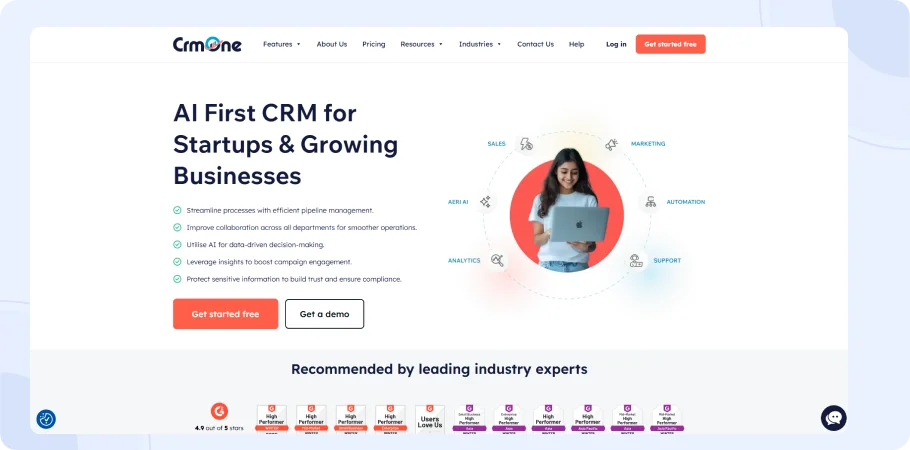
CrmOne is a simple and powerful CRM made for growing businesses, including media companies. It’s easy to use, affordable, and comes with all the features needed to manage subscribers, sales, campaigns, and support all in one place. Whether you’re running a digital publication, ad agency, or content platform, CrmOne helps you stay organized and grow faster.
Key Features
- Contact & Lead Management: Easily store and manage contact details, leads, and follow-ups.
- Campaign Tracking: Create and track email campaigns, newsletters, and promotions.
- Subscriber Management: Handle memberships, renewals, and cancellations with ease.
- Team Collaboration: Share tasks, updates, and pipelines with your team in real-time.
- Custom Dashboards & Reports: See what’s working and get insights with simple reports.
- Integrations: Works well with Gmail, social media, and other popular tools.
Pros
- Super easy to use
- Affordable for small and mid-size media companies
- All-in-one CRM for marketing, sales, and support
- Quick setup and helpful support team
Cons
- Some advanced features are only in higher plans
- Limited third-party app marketplace (but growing)
Pricing
- Startup: $119 unlimited users per month
- Unlimited: $199 unlimited users per month
2. SalesForce
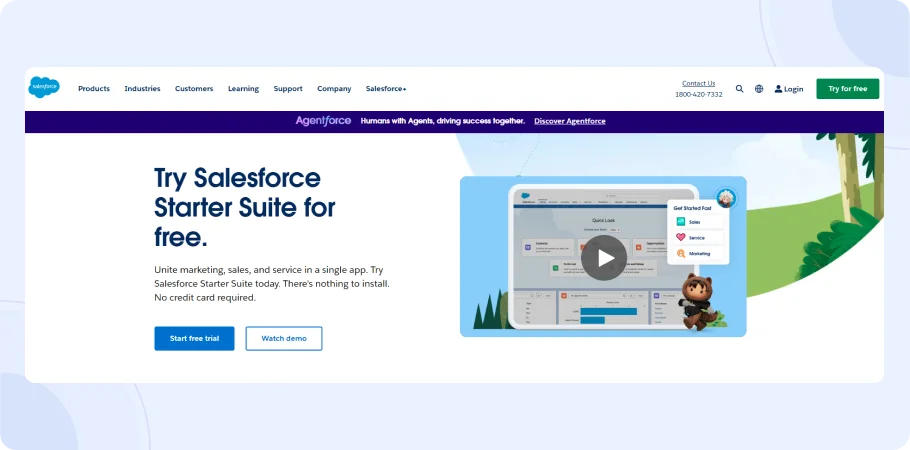
The CRM domain leadership position belongs to Salesforce. The extensive power combined with modification capabilities makes Salesforce appealing to numerous media and entertainment organizations.
Key Features
- Sales Cloud: It enables organizations to handle their complete sales operations from lead tracking to deal completion.
- Service Cloud: It enables organizations to both support their clients as well as handle all customer interactions.
- Marketing Cloud: It delivers automated marketing processes that tailor messages while enabling result insight tracking through its system.
- Analytics : These systems provide data analysis functionality to generate reports along with insights processing capabilities.
- AppExchange: It operates as a platform that hosts many applications and integration tools that enhance Salesforce functionality.
Pros
- Powerful and feature-rich
- Highly customizable
- Scalable
- Strong analytics
- Extensive integrations
Cons
- Can be expensive
- Steep learning curve
- Can be complex for smaller companies
Pricing:
They provide customized pricing, contact on there website for in-detailed pricing
3. Hubspot
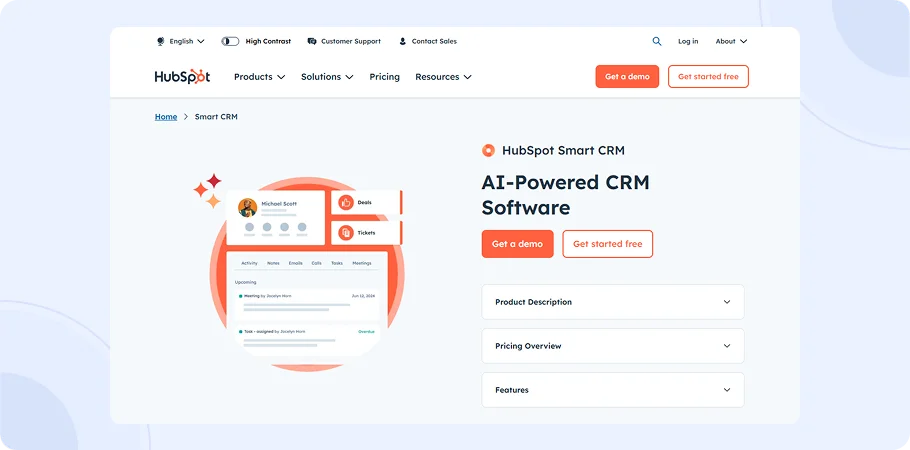
A significant number of companies including various sizes of businesses choose HubSpot CRM as their preferred CRM solution. The system provides an easy-to-use interface in addition to providing affordable features at an appropriate level. This CRM serves media organizations exceptionally well as their all-in-one solution.
Key Features
- CRM: It serves to manage contacts alongside deal tracking and customer database organization.
- Marketing Hub: It functions as an automated solution for marketing campaigns and leads generation through landing pages.
- Sales Hub: It enables organizations to conduct sales operations by tracking deals and managing the entire sales process from Start to Finish.
- Service Hub: It serves as a Customer Support Infrastructure as well as an Interaction Management Platform.
Pros
- User-friendly interface
- Free version available
- Strong marketing automation features
- Good for inbound marketing
- Excellent educational resources
Cons
- Paid plans can get expensive
- Customization options are more limited than Salesforce
- Reporting can be basic in lower-tier plans
Pricing
| Plans | Price |
|---|---|
| Marketing Hub Professional: | $800 per month |
| Marketing Hub Enterprise: | $3600 month |
Boost your Media Company with CRM. Do you want to know how?
4. Zoho CRM
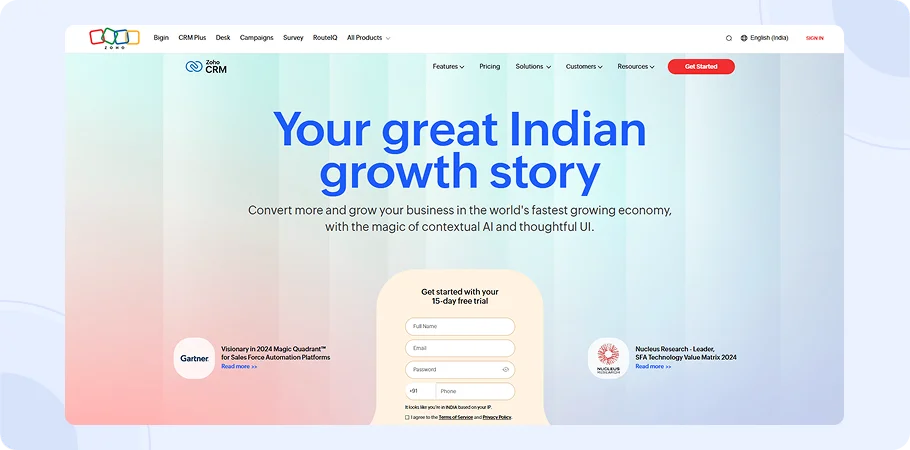
Zoho presents a full-featured cloud CRM with competitive pricing for customers. Media companies of modest size can obtain a full-featured CRM system with Zoho at an attractive price point. This CRM provides a strong feature set to media and entertainment companies, who need an affordable solution.
Key Features
- Sales Automation: This module helps to automate both sales activities together with lead monitoring and deal completions.
- Marketing Automation: Customers gain access to automated marketing campaigns alongside personalized messaging features and result-tracking capabilities through Marketing Automation.
- Customer Support: For providing customer support and managing customer interactions.
- Analytics: For generating reports, analyzing data, and gaining insights.
- Zoho Marketplace: A Marketplace where you can find numerous apps and integration options that extend Zoho CRM’s capabilities.
Pros
- Affordable pricing
- Wide range of features
- Highly customizable
- Strong automation capabilities
- Good mobile app
Cons
- An interface can feel a bit cluttered
- Customer support can be inconsistent
- Some advanced features require add-ons
Pricing
| Plans | Price |
|---|---|
| Standard: | $9 /user/month billed annually |
| Professional: | $16 /user/month billed annually |
| Enterprise: | $27 /user/month billed annually |
| Ultimate: | $30 /user/month billed annually |
5. Pipedrive
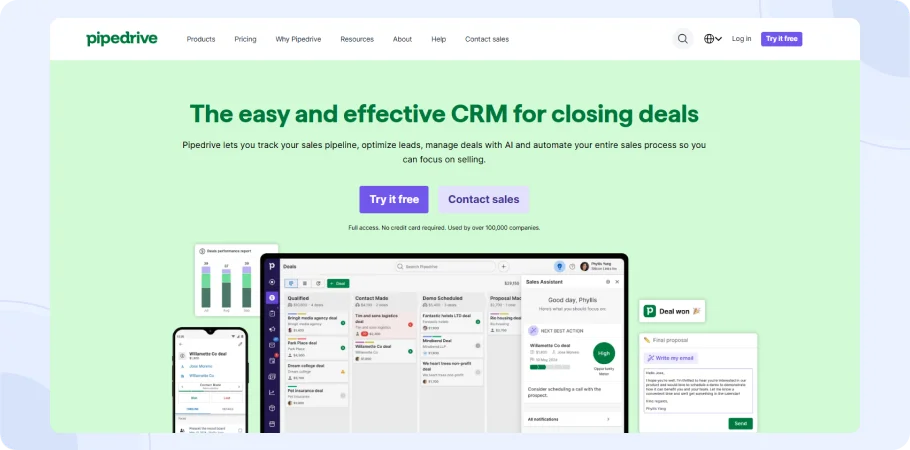
The CRM system Pipedrive stands out because of its friendly interface together with its powerful pipeline managerial capabilities. Its emphasis on sales processes makes Pipedrive valuable for media companies that derive revenue from advertising or sponsorship activities despite being developed for a different industry sector.
Key Features
- Pipeline Management: The platform enables users to manage pipelines in order to track deals through their stages during the sales process.
- Sales Management: The system enables automated dealing with sales-related duties through its capabilities for sending follow-up correspondence and scheduling reminders.
- Email Integration: For tracking email communications with prospects and customers.
- Reporting & Analytics: Zoho CRM provides reporting tools and analytics capabilities to both generate detailed reports and perform sales data analysis as well as provide valuable insights.
Pros
- Easy-to-use interface
- Strong pipeline management
- Good for sales teams
- Affordable pricing
- Good mobile app
Cons
- Marketing automation features are limited
- Reporting can be basic
- Less customization compared to some other CRMs
Pricing
| Plans | Price |
|---|---|
| Essential: | $14 Per seat, per month, billed annually |
| Advanced: | $24 Per seat, per month, billed annually |
| Professional: | $49 Per seat, per month, billed annually |
| Power: | $59 Per seat, per month, billed annually |
| Enterprise: | $79 Per seat, per month, billed annually |
6. Sugar CRM
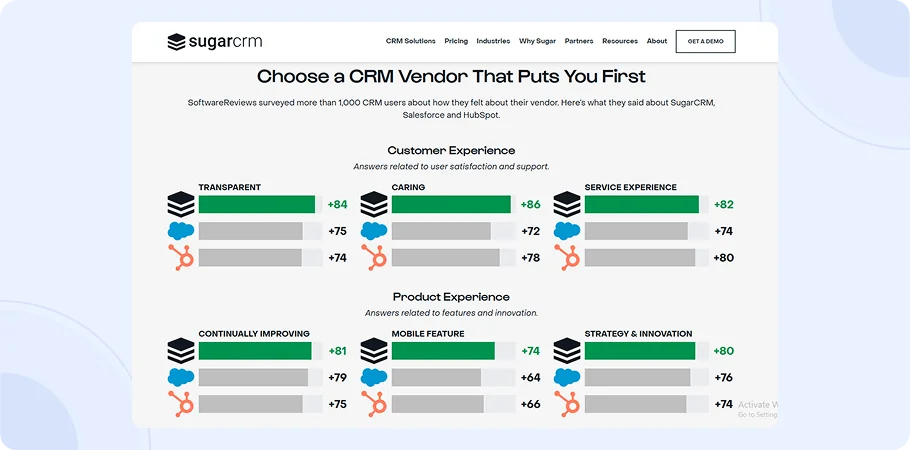
SugarCRM presents itself as a flexible system for media industry CRM customization needs. The CRM system presents marketing sales and service modules to deliver complete solutions for users. The high degree of customization makes SugarCRM a suitable CRM solution for media businesses that require customized features.
Key Features
- Sales Automation: The system utilizes sales automation software for both the automation of sales procedures and the tracking of leads together with the completion of sales.
- Marketing Automation: The marketing automation system helps organizations create automated marketing initiatives that deliver personalized content while monitoring campaign performance measures.
- Customer Service: For providing customer support and managing customer interactions.
- Customization: Users can transform the system through its highly adjustable features to align with their distinct business requirements.
Pros
- Highly customizable.
- Flexible deployment options.
- Wide range of features and integrations.
Cons
- Can be complex to set up and use.
- Can be expensive.
- May require technical expertise to customize and maintain.
Pricing
| Plans | Price |
|---|---|
| Essential: | $26 per user, per month, billed annually |
| Standard: | $82 per user, per month, billed annually |
| Advanced: | $119 per user, per month, billed annually |
| Premiere: | $189 per user, per month, billed annually |
7. Streak for Gmail
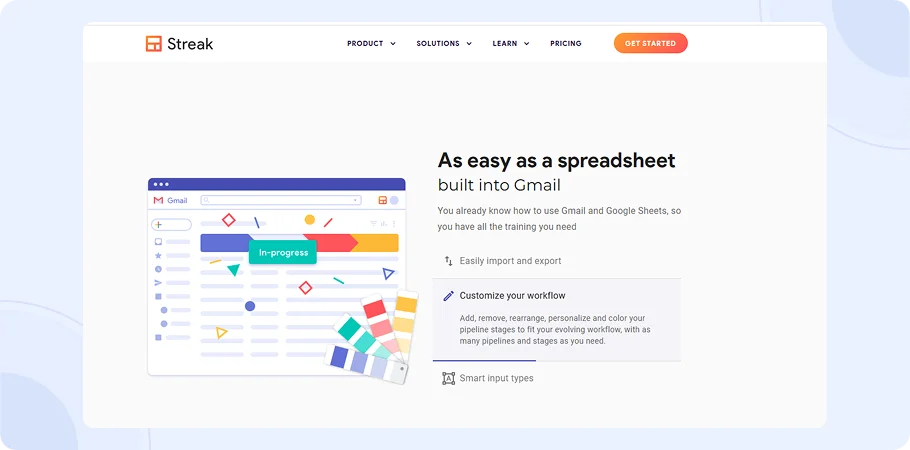
Streak stands out as a CRM application that interacts directly with the Gmail platform. This basic system proves beneficial to small businesses running their email communications through Gmail because it represents an uncomplicated solution. Streak stands as a basic CRM system dedicated to organizations that frequently work through Gmail.
Key Features
- Gmail Integration: Users can operate with contacts and monitor deals and unite with their team by using the Gmail interface.
- Pipeline Management: The tool provides pipeline visualization for tracking deals along with an operation system to drive them through the full sales cycle.
- Email Tracking: It allows users to track email click rates while enabling automatic follow-up email sequences.
Pros
- Easy to use.
- Affordable.
- Integrates directly with Gmail.
Cons
- Limited features compared to other CRMs.
- May not be suitable for larger companies.
- Relies heavily on Gmail.
Pricing
| Plans | Price |
|---|---|
| Pro: | $49 per user/month |
| Pro+: | $69 per user/month |
| Enterprise: | $129 per user/month |
8. Netsuite
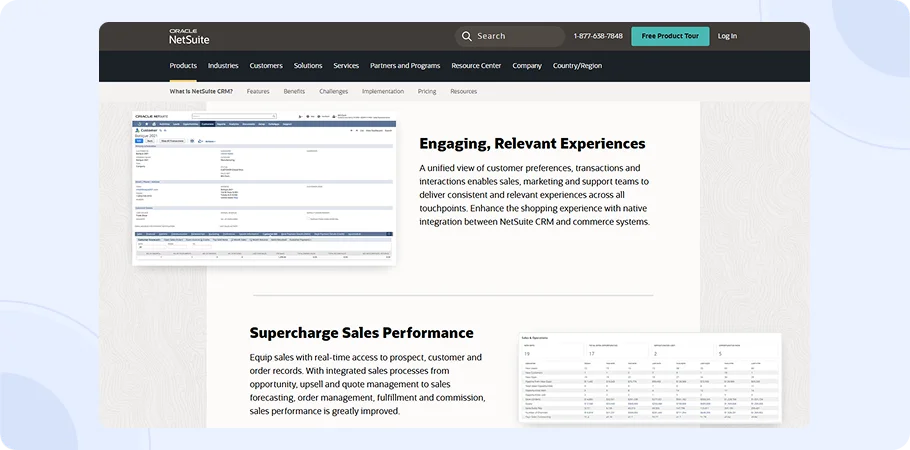
Both small and large media companies find NetSuite suitable as a powerful cloud-based CRM solution which Oracle Corporation maintains ownership of. The product combines wide-ranging sales marketing and customer service capabilities which makes it an extremely powerful CRM solution for media companies.
Key Features
- CRM: Sales force automation, marketing automation, customer service management.
- ERP: Financial management, inventory management, order management.
- E-commerce: Online store management, order processing, and customer relationship management.
Pros
- A comprehensive suite of features
- Scalable
- Good for e-commerce integration
- Strong reporting capabilities
Cons
- Can be expensive
- Complex to set up and use
- Steep learning curve
Cons
For pricing contact them on their website
9. Agile CRM
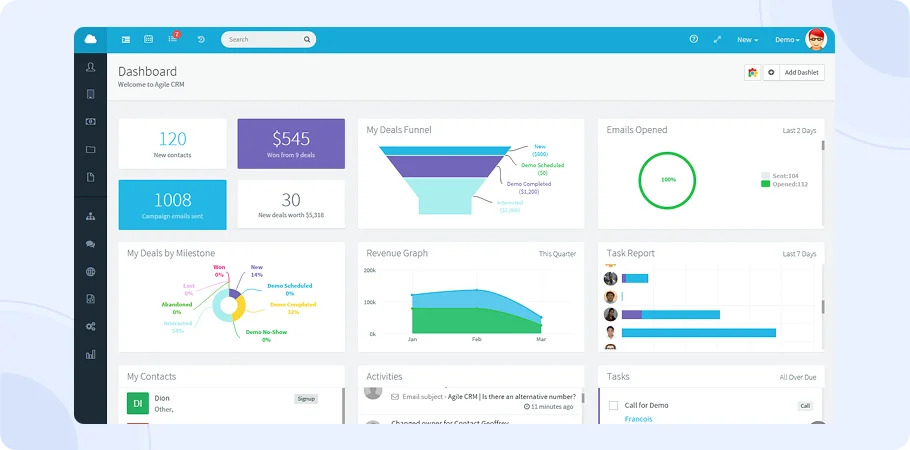
Agile CRM provides a single affordable solution that functions as a complete CRM software system tailored for startup businesses and businesses of various sizes in the media sector.
The system delivers core functionality units that serve both sales processes and marketing departments and provide both customer experience and service support. It’s popular among companies using social media for CRM thanks to built-in marketing tools and integrations.
Key Features
- CRM : Contact management, deal tracking, and sales automation.
- Marketing Automation: Email marketing, landing page creation, and lead scoring.
- Customer Service: Help desk, ticketing, and live chat.
Pros
- Affordable.
- All-in-one platform.
- Good for small businesses and startups.
Cons
- May not be as scalable as some other CRMs.
- Some features may be limited.
- Customer support can be inconsistent.
Pricing
| Plans | Price |
|---|---|
| Starter: | $8.99 per month |
| Regular: | $29.99 per month |
| Enterprise: | $47.99 per month |
10. Keap
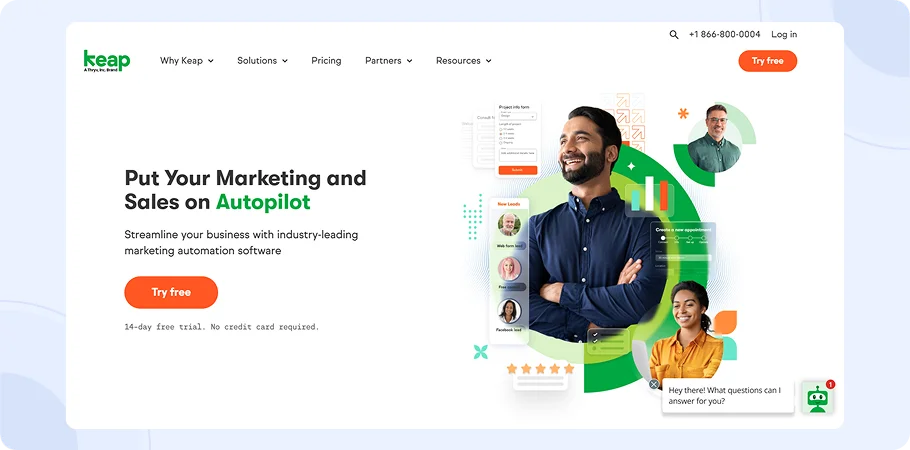
The system serves media companies that need automation for their marketing and sales operations. This CRM solution delivers effective automation capabilities to media companies that wish to automate their sales forecasting marketing operations.
Keap provides three main functions by offering CRM as well as marketing automation, sales automation, and e-commerce solutions.
Key Features
- CRM: Contact and lead management with segmentation tools to help manage client lists and relationships.
- Marketing Automation: Tools for email campaigns, workflow automation, and lead nurturing sequences.
- Sales Automation: Includes sales pipeline management, appointment scheduling, and automated follow-ups.
- E-commerce: Integrated invoicing, quotes, and payment processing capabilities.
Pros
- Strong marketing automation features
- Good for small businesses
- All-in-one platform
Cons
- Can be expensive
- Steep learning curve
- Interface can feel cluttered
Pricing
Starting at $249 per month (Billed at $2,988/year)
11. Insightly
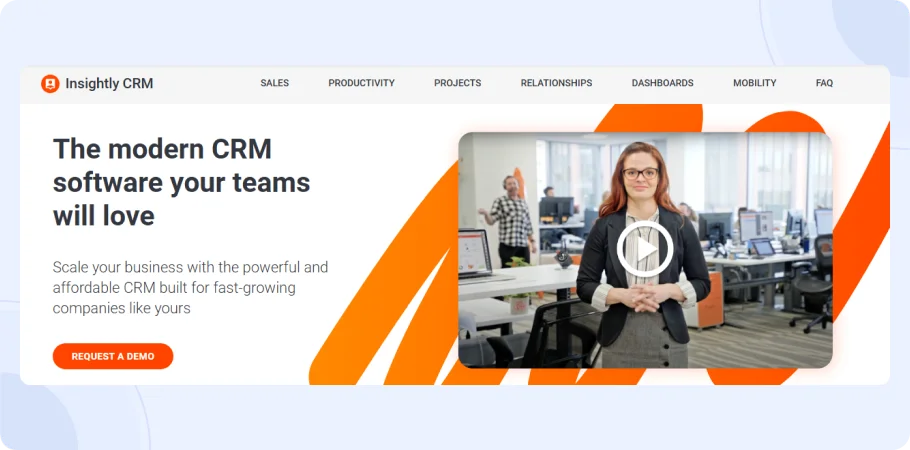
Businesses use Insightly as a cloud CRM system to unite project work with their sales and marketing operations. The system provides effective management capabilities for media companies operating between project and customer relationship management requirements. This CRM stands well for media organizations needing project and relationship management features.
Key Features
- CRM: Contact, lead, and opportunity management with custom fields and workflow automation.
- Project Management: Built-in project tracking, task assignments, and milestone planning.
- Marketing Automation: Includes email templates, campaign tracking, and web-to-lead forms.
- Integrations: Works with G Suite, Microsoft 365, Mailchimp, and more for seamless collaboration.
Pros
- Affordable pricing
- Good project management features
- Easy to use
- Good integrations
Pros
- Marketing automation features are limited
- Reporting can be basic.
- Customization options are more limited than some other CRMs
Pricing
| Plans | Price |
|---|---|
| Plus: | $29 per user/ month |
| Professional: | $49 per user/ month |
| Enterprise: | $99 per user/ month |
Conclusion
Your media company should select its CRM based on three factors: business scale, financial resources, and unique organizational requirements. Media organizations require CRM systems for sales operations, audience connection, and advertising control and the market offers suitable solutions for these purposes.
By implementing the right media CRM for media companies can improve efficiency, build better customer relationships, further business growth and drive revenue in an ever-changing industry. CRM for media companies also ensures you keep pace with audience expectations across digital platforms while staying ahead of your competition.
FAQs
1. What is the best CRM for small media companies?
Zoho CRM and Agile CRM are great affordable options with broad range of essential features for small teams.
2. Can a CRM help with content distribution?
Yes, CRMs can track content performance and help tailor distribution strategies based customer data and on audience behavior.
3. Are there CRMs that integrate with email platforms like Gmail?
Yes, tools like Streak and Insightly offer direct Gmail integration.
4. Do CRMs support advertising sales management?
Many CRMs like Salesforce and Pipedrive provide tools to manage ad sales pipelines and client communication.
5. Is it necessary to have marketing automation in a CRM?
For media companies and online channels, marketing automation is highly valuable to engage audiences and scale campaigns efficiently.
